Explanation of my 10 Ballon d'Or 1991
This is my ranking, my opinion on the Ballon d'Or of the year 1991. This ranking is based on the calendar year, not the season. What counts for this ranking is the player's regularity over the calendar year, the number of matches played, the ability to raise his level in big games, statistics (goals, assists, clean sheets, goals conceded, etc.) and trophies won (collective and individual).
#10 Raí
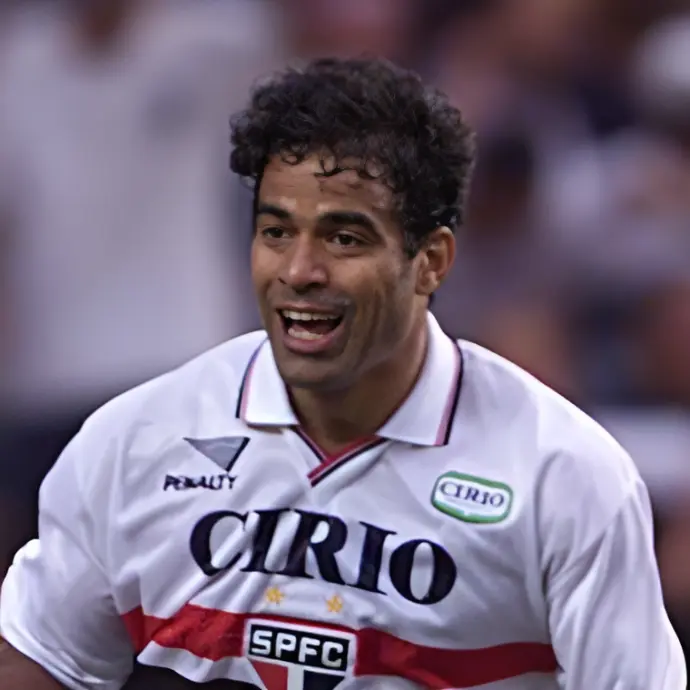
- Age : 25/26 years old
- Club : São Paulo
- Statistics : 58 games, 29 goals, / assists
- Trophies : Finalist Copa America, Brazilian League, São Paulo Championship
- Individual Awards : Brazilian League POTY, Brazilian League TOTY, São Paulo Championship POTY, São Paulo Championship TOTY, São Paulo Championship Golden Shoe (20 goals)
In 1991, Raí delivered a standout year, showcasing his technical brilliance, leadership, and ability to dictate play from midfield. As an attacking midfielder, he combined vision, precision, and an instinctive ability to unlock defenses, making him an indispensable figure for São Paulo FC. His performances in the Campeonato Brasileiro were instrumental in São Paulo’s triumph, as he led the club to the Brazilian Championship title, solidifying his status as one of the most influential playmakers in South American football. Raí’s ability to control the tempo of a match, execute pinpoint passes, and deliver decisive goals made him a nightmare for defenders. His leadership qualities and composure under pressure ensured São Paulo’s dominance, setting the stage for the club’s future continental success
#9 Chris Waddle
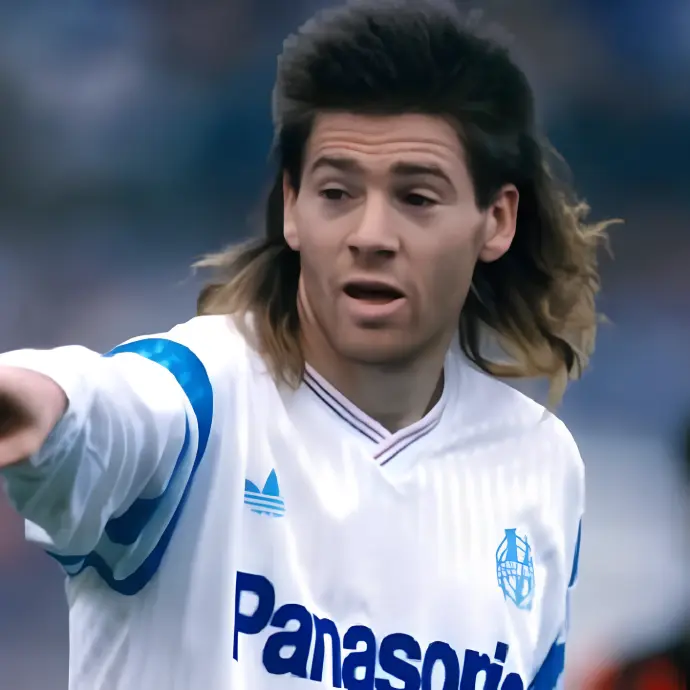
- Age : 30 years old
- Club : Olympique de Marseille
- Statistics : 51 games, 9 goals, 15 assists
- Trophies : Finalist Champions League, French League, Finalist French Cup
- Individual Awards : Champions League TOTY, French League TOTY
In 1991, Chris Waddle delivered a memorable year, showcasing his dazzling dribbling, creativity, and ability to produce moments of magic on the pitch. As an attacking midfielder, he combined flair, precision, and an instinctive ability to unlock defenses, making him an indispensable figure for Olympique de Marseille. His performances in Ligue 1 were instrumental in Marseille’s dominance, as he played a key role in securing the French league title, further cementing his status as one of the most exciting playmakers in European football. Waddle’s defining moment of the year came in the 1990–91 European Cup, where he was a crucial part of Marseille’s run to the final against Red Star Belgrade. His ability to dictate play, deliver pinpoint crosses, and create scoring opportunities made him a nightmare for defenders. Though Marseille ultimately fell short in the final, Waddle’s contributions throughout the tournament reinforced his reputation as one of the finest attacking midfielders of his generation.
#8 Gary Lineker
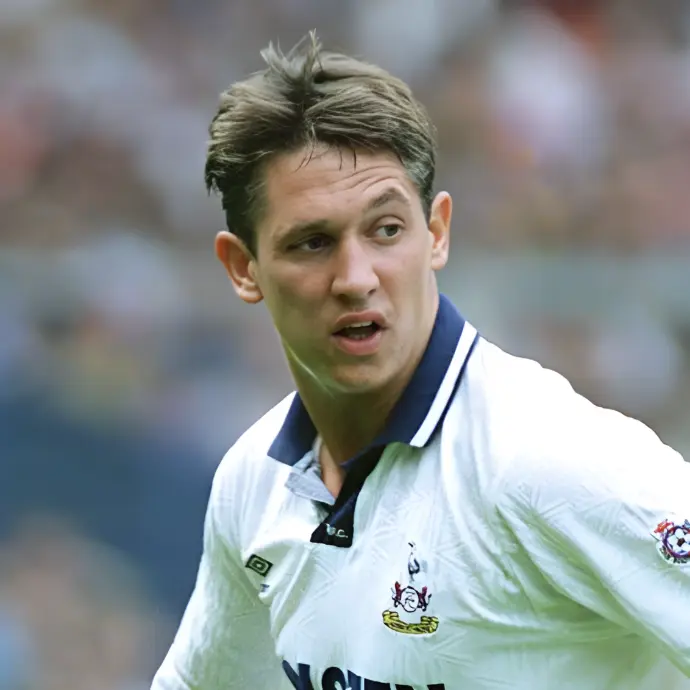
- Age : 30/31 years old
- Club : Tottenham Hotspur
- Statistics : 58 games, 38 goals, 3 assists
- Trophies : FA Cup
- Individual Awards : /
In 1991, Gary Lineker continued to demonstrate his world-class finishing, intelligence, and leadership on the pitch, solidifying his reputation as one of England’s greatest strikers. As the focal point of Tottenham Hotspur’s attack, he combined precision, movement, and an instinctive ability to find the back of the net, making him an indispensable figure for both Spurs and the English national team. Lineker’s defining moment of the year came in the FA Cup, where he played a crucial role in Tottenham’s triumph. His clinical finishing was instrumental in Spurs’ run to the final, and though he missed a penalty in the decisive match against Nottingham Forest, his presence and contributions throughout the tournament helped secure Tottenham’s first FA Cup victory since 1982. His performances earned him the FWA Footballer of the Year award, further cementing his status as one of the most consistent and prolific forwards of his generation.
#7 Gabriel Batistuta
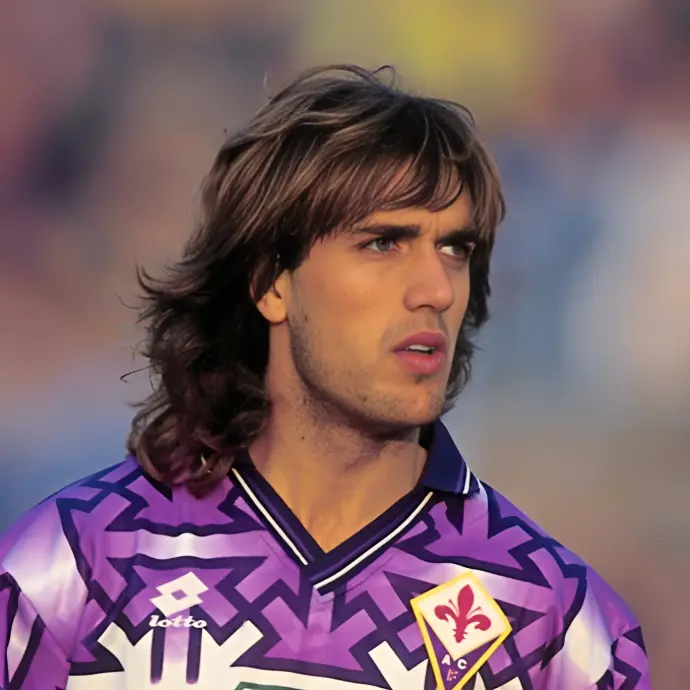
- Age : 21/22 years old
- Club : Boca Juniors/Fiorentina
- Statistics : 47 games, 25 goals, 1 assist
- Trophies : Copa America, Argentinian League
- Individual Awards : Copa America TOTT, Copa America Golden Shoe (6 goals)
In 1991, Gabriel Batistuta emerged as one of the most lethal strikers in world football, showcasing his powerful finishing, intelligent movement, and ability to deliver in crucial moments. As a forward, he combined strength, precision, and an instinctive goal-scoring ability, making him an indispensable figure for Boca Juniors and the Argentine national team. His defining moment of the year came in the Copa América, where he played a pivotal role in Argentina’s triumph, finishing as the tournament’s top scorer with six goals. His clinical finishing and ability to rise to the occasion ensured Argentina’s dominance, securing their first Copa América title since 1959. Batistuta’s performances at club level were equally impressive, as he continued to shine for Boca Juniors, earning a move to Fiorentina, where he would go on to become a club legend. His achievements in 1991 laid the foundation for his illustrious career, setting the stage for his dominance in Serie A and his continued success with Argentina on the international stage.
#6 Michael Laudrup
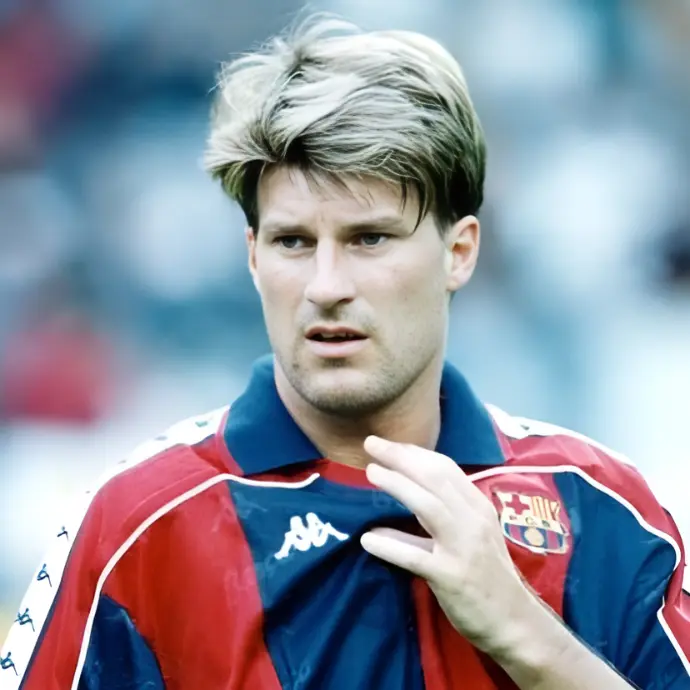
- Age : 26/27 years old
- Club : FC Barcelona
- Statistics : 48 games, 18 goals, / assists
- Trophies : Finalist Cup Winners Cup, Liga, Spanish Supercup
- Individual Awards : Liga TOTY
In 1991, Michael Laudrup continued to showcase his elegance, vision, and technical brilliance, solidifying his reputation as one of the finest playmakers in world football. As a key figure in Johan Cruyff’s “Dream Team” at FC Barcelona, he played a crucial role in the club’s La Liga triumph, helping Barcelona secure their second consecutive league title. His ability to dictate play, deliver precise assists, and glide past defenders made him an indispensable part of the team’s attacking fluidity. Beyond his domestic success, Laudrup was instrumental in Barcelona’s European campaign, guiding the club to the final of the 1990–91 European Cup Winners’ Cup, where they finished as runners-up. His performances throughout the season reinforced his reputation as one of the most intelligent and creative midfielders of his generation.
#5 Oscar Ruggeri
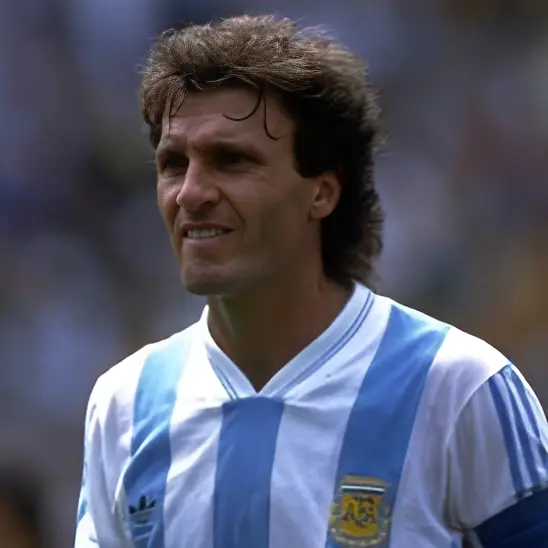
- Age : 29 years old
- Club : Vélez Sarsfield
- Statistics : 48 games, 3 goals, 1 assist
- Trophies : Copa America
- Individual Awards : South American POTY, South American TOTY, Argentinian POTY
In 1991, Oscar Ruggeri delivered a commanding year, showcasing his defensive solidity, leadership, and ability to rise to the occasion in crucial moments. As a center-back, he combined strength, tactical intelligence, and composure, making him an indispensable figure for Vélez Sarsfield and the Argentine national team. His defining moment of the year came in the Copa América, where he played a pivotal role in Argentina’s triumph, helping secure the nation’s first continental title since 1959. His performances throughout the tournament reinforced his reputation as one of South America’s finest defenders, earning him the prestigious South American Footballer of the Year award. Beyond his international success, Ruggeri remained a rock at club level, anchoring Vélez Sarsfield’s defense with his commanding presence and ability to organize the backline.
#4 Darko Pančev
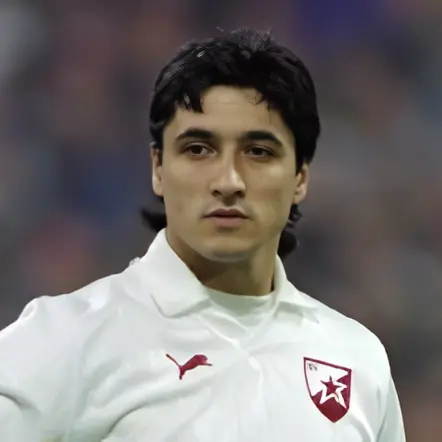
- Age : 25/26 years old
- Club : Red Star Belgrade
- Statistics : 58 games, 46 goals, / assists
- Trophies : Champions League, Intercontinental Cup, Finalist UEFA Cup, Yugoslav League, Finalist Yugoslav Cup
- Individual Awards : Champions League TOTY, Yugoslav TOTY
In 1991, Darko Pančev delivered a historic year, establishing himself as one of the most lethal strikers in European football. As the attacking spearhead of Red Star Belgrade, he combined precision, composure, and an instinctive ability to find the back of the net, making him an indispensable figure in the club’s golden era. His defining moment came in the European Cup Final, where he scored the decisive penalty in the shootout against Olympique de Marseille, securing Red Star’s first-ever European Cup title. His contributions throughout the tournament, including crucial goals in the knockout stages, reinforced his reputation as one of the most clinical finishers of his generation. Beyond his European triumph, Pančev dominated domestically, finishing as the top scorer in the Yugoslav First League and earning the prestigious European Golden Shoe for his incredible goal tally. His ability to dismantle defenses with his sharp movement and precise finishing made him a nightmare for opponents. His achievements in 1991 cemented his legacy as one of the finest strikers of his era, setting the stage for his move to Inter Milan, where he sought to replicate his success on the Italian stage.
#3 Dejan Savićević
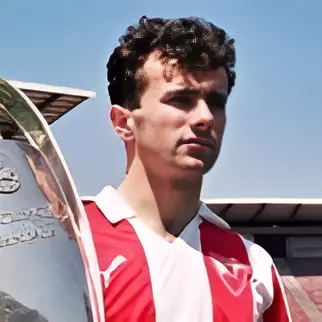
- Age : 24/25 years old
- Club : Red Star Belgrade
- Statistics : 48 games, 18 goals, / assists
- Trophies : Champions League, Intercontinental Cup, Finalist UEFA Cup, Yugoslav League, Finalist Yugoslav Cup
- Individual Awards : Yugoslav POTY, Champions League POTY, Champions League TOTY, Yugoslav League TOTY
In 1991, Dejan Savićević delivered a defining year, showcasing his technical brilliance, dribbling finesse, and ability to dictate play in crucial moments. As an attacking midfielder, he combined vision, agility, and an instinctive ability to unlock defenses, making him an indispensable figure for Red Star Belgrade and the Yugoslav national team. His impact was most evident in the European Cup, where he played a pivotal role in Red Star’s historic triumph. His creativity and attacking prowess were instrumental in guiding the club to victory in the final against Olympique de Marseille, securing Red Star’s first-ever European Cup title. Beyond his European success, Savićević was a driving force in Red Star’s domestic dominance, helping the club secure the Yugoslav First League title.
#2 Jean-Pierre Papin
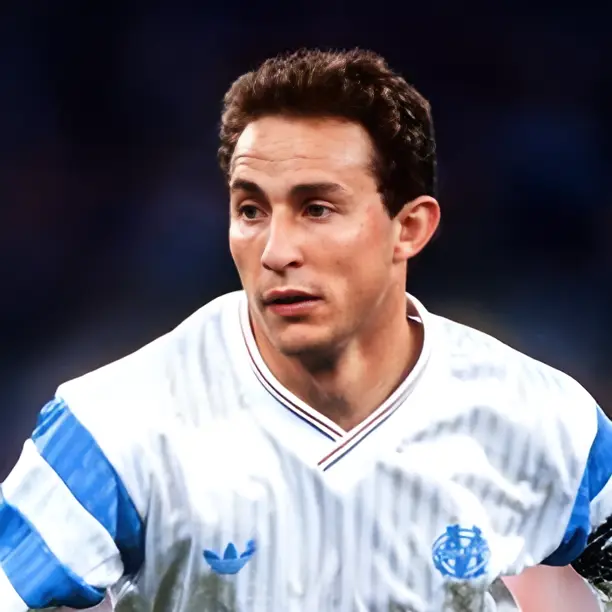
- Age : 27/28 years old
- Club : Olympique de Marseille
- Statistics : 57 games, 51 goals, 8 assists
- Trophies : Finalist Champions League, French League, Finalist French Cup
- Individual Awards : French POTY, Champions League TOTY, Champions League Golden Shoe (6 goals), French League TOTY, French League Golden Shoe (23 goals)
In 1991, Jean-Pierre Papin delivered a phenomenal year, cementing his status as one of the most clinical and dynamic strikers in world football. As the attacking talisman of Olympique de Marseille, he combined precision, agility, and an instinctive ability to score from any angle, making him an indispensable figure in the club’s dominance. His performances in Ligue 1 were nothing short of spectacular, as he led Marseille to their fourth consecutive league title, finishing as the league’s top scorer for the fifth straight season. His ability to execute stunning volleys—dubbed “Papinades”—became his trademark, leaving defenders and goalkeepers helpless. Papin’s defining moment of the year came in the Ballon d’Or, where he was crowned the best player in Europe, becoming the first Frenchman since Michel Platini to win the prestigious award. His influence extended beyond domestic success, as he guided Marseille to the 1991 European Cup Final, where they narrowly lost to Red Star Belgrade.
Winner : Lothar Matthäus
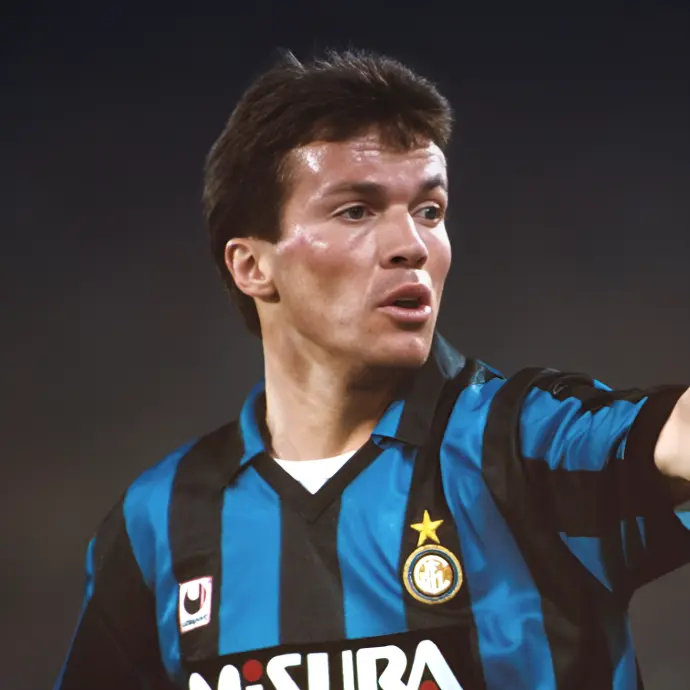
- Age : 29/30 years old
- Club : Inter Milan
- Statistics : 53 games, 18 goals, / assists
- Trophies : Europa League
- Individual Awards : Europa League POTY, Europa League TOTY, Serie A TOTY
In 1991, Lothar Matthäus was simply the most complete footballer in the world. His ability to dominate the midfield, dictate the tempo of a match, and contribute both defensively and offensively made him unmatched in his era. Whether it was his tactical intelligence, leadership, or sheer determination, Matthäus embodied everything a world-class player should be. His performances for Inter Milan were nothing short of extraordinary, leading the club to UEFA Cup glory, proving his ability to deliver on the biggest stage. His presence in midfield was commanding—he could break up opposition attacks, drive forward with precision, and unleash powerful strikes from distance. Beyond his club success, Matthäus was the heartbeat of the German national team, continuing to lead with authority after captaining them to World Cup glory in 1990. His influence extended beyond his technical ability—he was a true leader, someone who could inspire his teammates and take control of a match when it mattered most. His dominance in 1991 was recognized globally, as he was named FIFA World Player of the Year, the first-ever recipient of the award. No other player combined versatility, intelligence, and consistency like he did. While others had flashes of brilliance, Matthäus was relentless, delivering world-class performances week in and week out. His achievements in 1991 solidified his legacy as one of the greatest midfielders of all time, proving that he was not just a great player—but the best in the world that year.